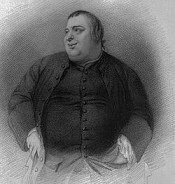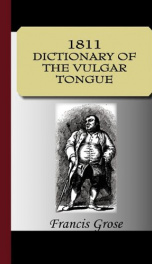Grose Francis

Francis Grose (1730/1731-12 June 1791), born at Greenford in Middlesex, antiquary, draughtsman, and lexicographer, of Swiss extraction. Grose's father, also Francis Grose, was a wealthy Swiss jeweller), was Richmond Herald from 1755 to 1763. Probably the eldest son, Francis served in the Army, retiring at the rank of captain. He became Paymaster and Adjutant of the Surrey Militia, a position that led to his financial ruin as he kept no books and gave no receipts, the deficits costing him all his inherited wealth. Robert Burns met him while he was staying with Robert Riddell at the Friar's Carse in Scotland collecting material for his Scottish work. Burns became firm friends with this by now this fat, and suggested to him that he should include Alloway Kirk in his Scottish work. Grose agreed on condition that Burns provided a witch tale to go with his drawing. In June 1790, Burns sent Grose a prose tale with a variant in a letter to Grose, following it up with a rhymed version, 'Tam o' Shanter'. Grose's Antiquities of England and Wales (1773–87), which was well received, and thereafter, in 1789, set out on an antiquarian tour through Scotland, the fruit of which was Antiquity of Scotland (1789–91). He afterwards undertook a similar expedition to Ireland, but died suddenly in Dublin after an apoplectical stroke. Edward Ludwich, who had already published a book on Irish antiquities, completed the final volume of Grose's Antiquities of Ireland in 1791.[1] In addition to the works above mentioned, he wrote A Classical Dictionary of the Vulgar Tongue (1785), A Provincial Glossary (1787) and Treatise on Ancient Armour and Weapons. He was an accomplished draughtsman, and illustrated his own works. Additionally, it is noted that he is the author of Advice to the Officers of the British Army: With the addition of some Hints to the Drummer and Private Soldier, which was published in 1783 as a mocking look backwards on the conduct of the war against the American Colonies. Every instance of corruption, disregard and vice are suggested for every rank of the army. Tongue in cheek, but obviously rooted in truth, it is a great companion to Vulgar Tongue. Two parodies by Thomas Bridges, A Travestie of Homer and The Battle of the Genii, were once attributed to Francis Grose. This article incorporates public domain text from: Cousin, John William (1910). A Short Biographical Dictionary of English Literature. London, J. M. Dent & sons; New York, E. P. Dutton.
do you like this author?
What readers are saying
What do you think? Write your own comment on this book!
write a commentWhat readers are saying
What do you think? Write your own comment on this author!
write a commentBook list

the british plutarch containing the lives of the most eminent statesmen patrio
Series:
Unknown
Year:
Unknown
Raiting:
4/5
Show more
add to favoritesadd In favorites

a treatise on ancient armour and weapons illustrated by plates taken from the o
Series:
Unknown
Year:
Unknown
Raiting:
4/5
Show more
add to favoritesadd In favorites

1811 Dictionary of the Vulgar Tongue
Series:
Unknown
Year:
Unknown
Raiting:
1/5
A dictionary of buckish slang, university wit, and pickpocket eloquence. Unabridged from the original 1811 edition.
Show more
add to favoritesadd In favorites
Book list

the british plutarch containing the lives of the most eminent statesmen patrio
Series:
Unknown
Year:
Unknown
Raiting:
4/5
Show more
add to favoritesadd In favorites

a treatise on ancient armour and weapons illustrated by plates taken from the o
Series:
Unknown
Year:
Unknown
Raiting:
4/5
Show more
add to favoritesadd In favorites

1811 Dictionary of the Vulgar Tongue
Series:
Unknown
Year:
Unknown
Raiting:
1/5
A dictionary of buckish slang, university wit, and pickpocket eloquence. Unabridged from the original 1811 edition.
Show more
add to favoritesadd In favorites
What readers are saying
What do you think? Write your own comment on this author!
write a commentif you like Grose Francis try:
readers also enjoyed
What readers are saying
What do you think? Write your own comment on this author!
write a commentif you like Grose Francis try:
readers also enjoyed
Do you want to read a book that interests you? It’s EASY!
Create an account and send a request for reading to other users on the Webpage of the book!

